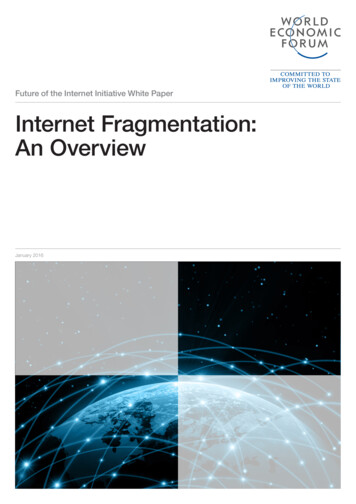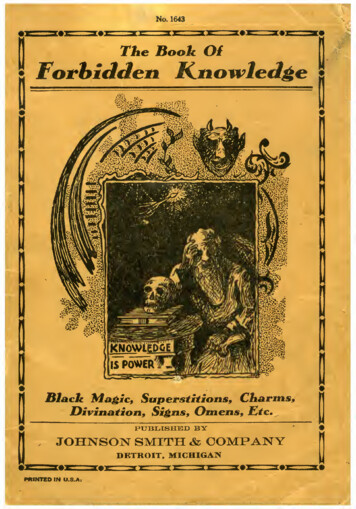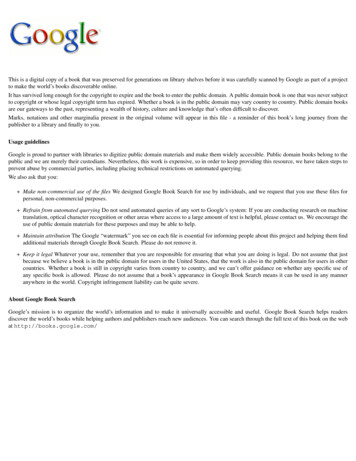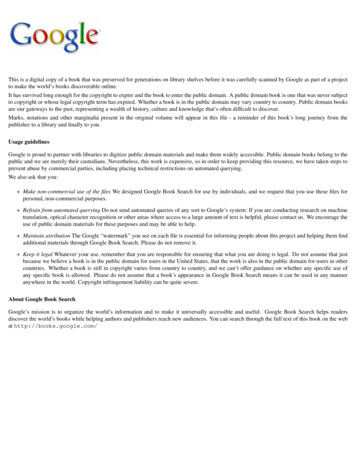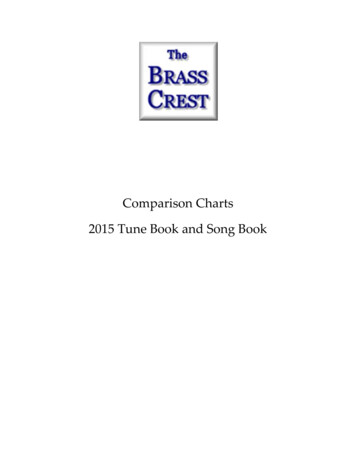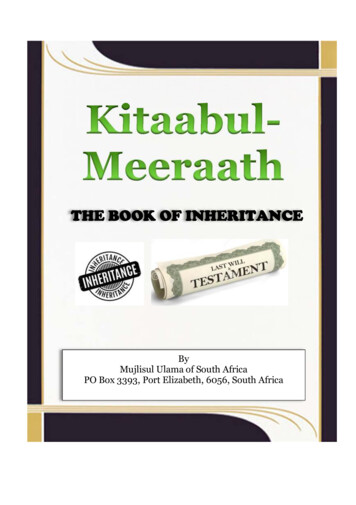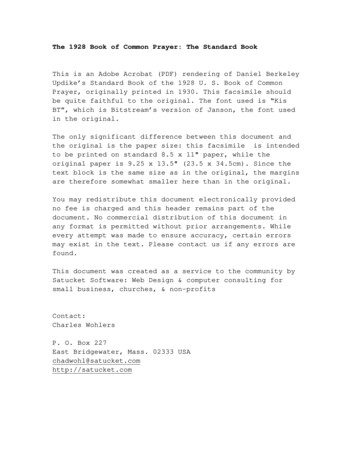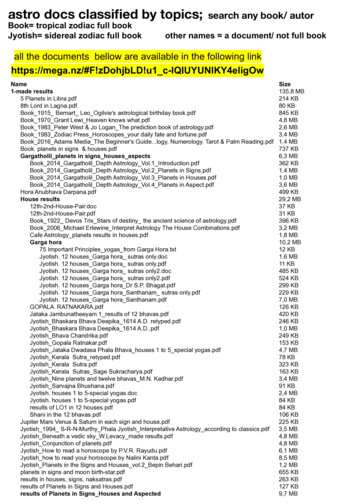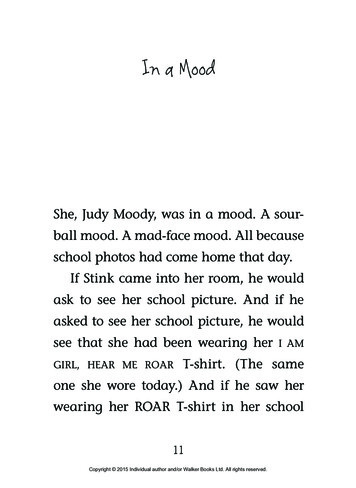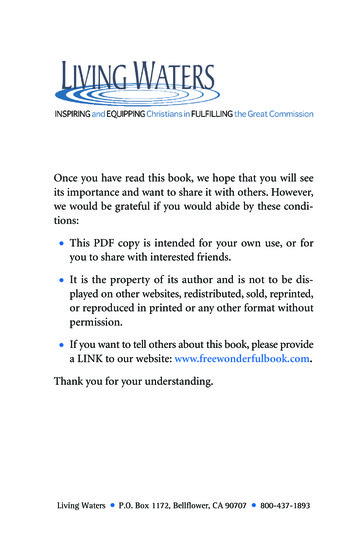
Transcription
Do you desire that you could understand the Book of Allah without a translation?Do you wish to learn the language of the Qur’an?You do not have to go to the Middle East to learn Arabic!Now you can learn the language of the Qur’an from the comfort of your home, at your convenience.Visit www.LQToronto.com, watch/download the DVDs, textbooks, solutions to the exercises and more ofthe Madina Books Arabic Language Course, for free!www.LQToronto.comemail: info@lqtoronto.comHANDOUTSForMadina Book 1Prepared byThe Institute of the Language of the Qur’an(Toronto)(NO Copy rights reserved)SubjectParts of the Speech .The Arabic Alphabet .Arabic Nouns Have Endings .Nominal Sentence .Cases Exercises .Sound Triliteral Verbs .Jarun Wa Majroorun From Qur’an Pronouns .Pronouns-01-solved Pronouns-01 Mudafu Mudafu Alei .Mudafu Mudafu Alei From Qur’an Mudafu Mudafu Alei - Examples .Phrases Feminine Gender Adjectives Nominal Sentences From Qur’an .Grammatical Analysis Dual and Sound Plurals .Broken Plurals Singular-Dual-Plural .Singular-Dual-Plural-Solved Numbers .Types of Khabar .Page1234568910121415161718192223272933353739
Parts of the SpeechIn English language there are 8 Parts of Speech njunctionInterjectionIn Arabic language there are 3 Parts of Speech:ِ اﺳﻢ ٌْ Nounٌِْ ﻓﻌﻞ Verb ﺣﺮف ٌ َْ ParticleBut these three Parts encompass all eight Parts of Speech of the English Language.Parts of Speech in Arabic Languageٌ َْParticle ﺣﺮف Preposition Conjunction ﺟﺮ ُ َْ ﺣﺮف َ ﱟ ٍ ْ ﺣﺮف َﻋ ﻄﻒ ُ َِْVerb ٌ ﻓﻌﻞ ْVerb (same as in English)ِNoun اﺳﻢ ٌْNoun Pronoun Adjective Adverb Interjection Parts of the Speechِ اﺳﻢ ٌَِْ ﺿﻤ ْﻴ ٌـﺮ ٌ ﺻﻔﺔ َ ِ / ـﻌﺖ ٌ ْ َ ﻧ ﻇﺮف ٌ َِِْ ْ ِ اﺳﻢ اﻟﻔﻌﻞ ُْPage 1
The Arabic Alphabet and Vowel SignsThe Arabic letters of the alphabet are twenty nine (29) in number, all of which, with exception ofAlif, are consonants.Consonants means it has speech sound.There are three vowel signs in Arabic.FATAHKASRAHDUMMASUKUN( ) ـ ـَـ ـ ( ) ـ ـِـ ـ ( ) ـ ـُـ ـ ( ) ـ ـْـ ـ denoting “a”e.g.denoting “i”e.g.denoting “u”e.g. َد da ِد di َر ra ِر ri ُد ُر du ruit is the sign denoting absence of a vowel.A consonant that does not carry any vowel is marked by a Sukun.In Arabic there are three (3) parts of speech.ِ (Noun)ِ اﺳﻢ ﺣﺮف ٌ ْ َ (Particle)ْ (Verb)ٌٌْ ﻓﻌﻞ ِArabic ﺳﻢ ٌ ْ ا includes English nouns, pronouns, adjectives and adverbs.ِArabic ﻓﻌﻞ ٌ ْ is co-extensive with English verbs.ِ and ِﻓﻌﻞ are ﺣﺮف All words besides اﺳﻢ ٌ ْ َ - Particles.ٌٌِِِْْ ْ َ) . اﺳﻢ ٌ ْ (noun) may be indefinite (ٌ ﻧﻜﺮة َ َ ) or definite (ٌَ ﻣﻌﺮﻓﺔ There are no definite or indefinite articles in Arabic language equivalent to English a, an, the.Indefiniteness ofِ اﺳﻢ ٌْis indicated by ـﻨﻮﻳﻦ ْ ِ َْ ﺗ ( nunation at the end of the noun ) which means thevowel sign is doubled at the end of the word.Definiteness is indicated by َْال prefixed to the noun.ِ ﻛﺘﺎب ـﻠﻢ ٌ َ a bookٌ ََ ﻗ a penِ ْﻜﺘﺎب ْﻘﻠﻢ ُ َ اﻟ the bookُ َ َ اﻟ the penِSince اﺳﻢ ْ ِ َْ ﺗ and َْال do not coexist.ٌ ْ cannot at the same time be definite and indefinite, ـﻨﻮﻳﻦ ِ ْﻜﺘﺎب ٌ َ اﻟ and ْﻘﻠﻢ ٌ َ َ اﻟ will be incorrect.Tanween is also used with proper nouns i.e. ﻣﺤﻤﺪ ٌ ُ َ ﱠ ، ﺧﺎﻟﺪ ٌ ِ َ ، ﻳﺪ ٌ ْ َز . Even though there is atanween at the end of the noun, these proper nouns are definite.The Arabic AlphabetPage 2
Arabic nouns have ENDINGSto show their functions in a sentence.Just like us, when we go to office, Bank or factory for work we have work cloths or uniforms, when wego for formal functions like weddings, Valimas or reception, we dress accordingly. When we are athome, we wear different cloths and when we retire for the night to sleep, we put on sleeping dress.In short, we dress according to what the occasion or function demands.Similarly, the Nouns have different endings to show their function in a sentence. It can be a subject( Nominative case or ٌ ﻣﺮﻓﻮع ُ ْ َ ending ) or it can be an object of a verb ( Accusative case or ب ٌ ﻣﻨﺼﻮ ُ ْ َ ending )or it can be a possessor of a thing or come after a preposition or an adverb ( Genitive case or ﻣﺠﺮوٌر ُْ َending ).There are three endings of Noun (the vowel sign on the last letter of the noun). ب ُ َ ﱠ ، ب َ ِ ، ب ٌَِ َﺑﺎ ، ب ٌ ﻛﺘﺎ ُ اﻟَْﺒﺎ ، ﻣﺤﻤٌﺪ ُ اﻟﻜﺘﺎ َﺑﺎًﺑﺎ ، ب َ اﻟﺒﺎ ، ﻣﺤﻤًﺪا ، ﻛﺘﺎًﺑﺎ ، ب َ اﻟﻜﺘﺎ ٍ ﺑﺎ ، ب ِ اﻟﺒﺎ ، ﻣﺤﻤٍﺪ ، ب ٍ ﻛﺘﺎ ، ب ِ اﻟﻜﺘﺎ ب 1. Dammah2. Fatah3. Kasrah1. When the last letter of a noun has a DAMMAHIt is said to beُ ْ َ (it indicates Nominative Case)ٌ ﻣﺮﻓﻮع .ٌ ﺖ ﺟﻤﻴﻠﺔ ٌ آﻣﻨﺔ ُ ﺑﻨ َِ ْ ُ ﺐ . ﻣﺠﺘﻬٌﺪ ٌٌ ﺣﺎﻣﺪ ﻃﺎﻟ . اﻟﺴﻮِق ذﻫﺐ ﻣﺤﻤٌﺪ إﻟﻰ ﱡ َ ََ2. When the last letter of a noun has a FATAHIt is said to be ب ٌ ﻣﻨﺼﻮ ُ ْ َ (it indicates Accusative Case) أﺷﻬﺪ ﱠ . ورﺳﻮﻟﻪ ُ َ ً أن ﻣﺤﻤﺪا ُ َُْ ُ ُ َ َ ُ ﻋﺒﺪﻩ . ﻋﻨﺪَك َ ْ ِ ً دوﻻرا ْ ُ ﻛﻢ َْ. اﻟﺴﻮِق ﻳﺖ ﻣﺤﻤﺪاً ﻓﻲ ﱡ ُ َْ َرأ 3. When the last letter of a noun has a KASRAHIt is said to be ﻣﺠﺮوٌر ُ ْ َ (it indicates Genitive Case) ﺷﻬٍﺮ ﻫﺬا ؟ ﱡ ْ َ أي أي َﻳﻮٍم ﻫﺬا ؟ ﱡ . اﻟﺴ ِﺮﻳِﺮ ﻟﺴﺎﻋﺔُ ﻋﻠﻰ ﱠ َ ا ﱠ ِ. ﺎب ﻣﺤﻤٍﺪ ُ َ ﻫﺬا ﻛﺘ Please memorize the above ARABIC TERMS and watch carefully theENDING VOWEL SIGNS ON NOUNS TO KNOW ITS FUNCTION INTHE SENTENCE.Arabic Nouns Have EndingsPage 3
َ ْ ُ )اَﻟ ْﺠﻤﻠﺔُ اﻻ ْ ِ ﱠ Nominal Sentence ( ُ ﺳﻤﻴﺔ What is a sentence?Sentence is a group of words which make complete sense.Muhammad is a student.Hamid is sick.The core ingredients of any sentence are a subject and a predicate. The subject names a person, a placeor a thing we are talking about. The predicate makes a statement about the subject. In other words thepredicate is the part of a sentence which expresses what is said about the subject.In the above two sentences Muhammad and Hamid are subjects and “is a student” and “is sick” arepredicates.In Arabic language there are two kinds of sentences.The one which begins with a nounِ)( اﺳﻢ ٌْAnd the one which begins with a verbis called nominal sentenceِ( ٌ ﻓﻌﻞ ْ ) is called verbal sentenceWe shall discuss here only the nominal sentence.A simple nominal sentence is of this form:َ ْ ُ ْ اﻟ ﺠﻤﻠﺔُ اﻻ ْ ِ ﱠ ُ ﺳﻤﻴﺔ َ ْ ُ ْ اﻟ ﺠﻤﻠﺔُ اﻟْ ِ ْ ِﱠ ُ ﻔﻌﻠﻴﺔ ِ ٌ َز ﻋﺎﻟﻢ ٌْ َ ﻳﺪ ٌِِ ﻋﺎﻟﻤﺔ َ َ ُ ﻓﺎﻃﻤﺔ َ َ ذﻛﻲ ُ َ اَﻟ َْﻮ ﻟﺪ َ ِ ﱞ ِ ْﺒﻨﺖ ٌ ﺟﻤ ْﻴ َـﻠﺔ َ ُ ِْ اَﻟ Zayd is learned.Fatimah is learned.The boy is intelligent.The girl is beautiful.Just like in English, a nominal sentence in Arabic has two parts:Subject( ُ ْﻤﺒﺘﺪأ َ َْ ُ ) اَﻟ and Predicate ( ْﺨﺒَ ُـﺮ َ ) اَﻟ The noun with which the nominal sentence begins is calledwhich says something about it is called( ٌ ﻣﺒﺘﺪأ َ َْ ُ ) subject, and the other part( ) َﺧﺒَ ٌـﺮ predicate.Usually, the subject of a nominal sentence is a definite noun, either a proper noun like Zayd andFatimah , a noun with the definite article like ْﻮﻟﺪ ُ َ َ اَﻟ and ْﺒﻨﺖ ُ ِْ اَﻟ or a pronoun.The predicate is usually indefinite, and agrees in gender with the subject.Both the subject and the predicate are marfu(double) dumma.Nominal Sentenceُ ْ َ , that is, it will have one dumma or tanweenٌ ﻣﺮﻓﻮع Page 4
Put the following nouns into their respective “cases”. First as indefinite then as definite nouns;then change them into feminine nouns and do like wise. Do as shown in the examples.FEMININEGenitiveMASCULINEAccusative Nominative ﻣﺠﺮور ٌ ُْ ٍَ ِ ﻣﺴﻠﻤﺔ َ ُْ ﻣﻨﺼﻮب ٌ ُ ًَِْ ﻣﺴﻠﻤﺔ َ ُُْ ْ َﻣ ٌ ﺮﻓﻮع ٌِ ﻣﺴﻠﻤﺔ َ ُِْ ِ اﻟﻤﺴﻠﻤﺔ َ َُِْ اﻟﻤﺴﻠﻤﺔ َ ُُِْ اﻟﻤﺴﻠﻤﺔ َ ُْCases ExercisesGenitiveAccusative Nominative ﻣﺠﺮور ٌ ُْ ٍَِْ ُ ﻣﺴﻠﻢ ﻣﻨﺼﻮب ٌ ُ ًَِْ ﻣﺴﻠﻤﺎ ُِِْْ ُ اﻟﻤﺴﻠﻢ ِ اﻟﻤﺴﻠﻢ َ ُُْ ٌَْ ﻣﺮﻓﻮع ِ ﻣﺴﻠﻢ ٌ ُْ ﺻﺎدق ٌَِِ ﻋﺎﻟﻢ ٌ َِ ﻣﺆﻣﻦ ٌ ُْ ﻣﺪرس ٌ َُﱢ ِ ﻛﺎﻓﺮ ٌِ ﻛﺎذب ٌ ﻣﺸﺮك ٌِ ْ ُِ ﻃﺎﻟﺐ ٌ ﺐ ٌ ﻃَﺒِﻴ ِ اﻟﻤﺴﻠﻢ ُ ُْPage 5
Paradigm of the Unaugmented Triliteral VerbGroup I - Iِ( ﺣﺴﺐ )ح َ َ ﺑﺎب ِِ ﻳﺤﺴﺐ َ َﺣ ُ ْ َ : ﺴﺐ HethoughtHeinheritedِ ﺣﺴﺐ َ َ ورث َ َِGroup I - Aِ( ﺳﻤﻊ )س َ َ ﺑﺎب ِ ﻳﺴﻤﻊ ُ َ ْ َ : ﺳﻤﻊ َ َHe heardHeunderstoodHe playedHememorized,protectedHe drankHelaughedHebecamehappyHe rodeHeworkedHe knewHe showedmercy uponHefollowedِ ﺳﻤﻊ َ َ ﻓﻬﻢ َ َِِ ﻟﻌﺐ َ َ ﺣﻔﻆ َ َِ ﺷﺮب َ َِ ﺿﺤﻚ َ َِ ﻓﺮح َ َِِ ﻛﺐ َ َر ِ ﻋﻤﻞ َ َِ ﻋﻠﻢ َ َِ رﺣﻢ َ َ ﺗﺒﻊ َ َِGroup U - UGroup A - A( ﻛﺮم )ك َ ُ َ ﺑﺎب ( ـﺘﺢ )ف َ َ َ ﺑﺎب ﻓ ﻳﻜﺮم ُ ُ ْ َ : ﻛﺮم َُ َHe becamenobleHe movedawayHe becamelarger,biggerHeapproached ﻛﺮم َُ َ ـﻌﺪ َ ُ َ ﺑ َﻛﺒُ َـﺮ ـﺮب َ ُ َ ﻗ ـﻔﺘﺢ ُ َ ْ َ ﻳ : ـﺘﺢ َ َ َ ﻓ HeopenedHe wentHeboweddownHeraisedHe didHesearchedHe nefitedHebeganHe askedHe read ـﺘﺢ َ َ َ ﻓ ذﻫﺐ َ ََ ﻛﻊ َ َ َر رﻓﻊ َ ََ ـﻌﻞ َ َ َ ﻓ ﺑﺤﺚ َ ََ ﻗﻄﻊ ََ َ ﺟﻤﻊ َ ََ ﻣﻨﻊ َ ََ ﺷﺮح َ ََ ﻧﺠﺢ َ ََ ـﻔﻊ َ َ َ ﻧ َ ﺑﺪأ ََ ﺳﺄل ََََ ﻗَـ َﺮأ ِ ﱠ ِ ْ ِ أﺑﻮاب اﻟﻤﺠﺮد اﻟﻔﻌﻞ اﻟﺜﱡﻼَ ِ ﱢ ُ ََْ ُ ﺛﻲ Group A - IGroup A - U( ﺿﺮب )ض َ َ َ ﺑﺎب ﻳﻀﺮب ُ ِ ْ َ : ﺿﺮب َ ََ( ﻧﺼﺮ )ن َ َ َ ﺑﺎب He struckor hitHe satHewashedHereturnedHedescendedHe brokeHe knewHe liedHe waspatientHetriumphed ,overpoweredHe carried ﺿﺮب َ ََ ﺟﻠﺲ َ ََ ﻏﺴﻞ َََ رﺟﻊ َ ََ ـﺰل َ َ َ ﻧ ﻛﺴﺮ ََ َ ﻋﺮف َ ََ ﻛﺬب َ ََ ﺻﺒََ َـﺮ ﻏﻠﺐ َ ََ ﺣﻤﻞ َ ََ ـﻨﺼﺮ ُ ُ ْ َ ﻳ : ﻧﺼﺮ ََ َHe helpedHe wroteHe enteredHe seekedHeprostratedHe killedHe studiedHe livedHethankedHe cookedHe createdHe lookedHe leftHeattendedHe failedHeprovided ,bestowed orblessedHerememberedor mentionedHeworshippedHe cameout orexitedHeorderedHe ateHe tookSound Triliteral Verbs ﻧﺼﺮ ََ َ ﻛﺘﺐ َ ََ دﺧﻞ َ ََ ﻃﻠﺐ َ ََ ﺳﺠﺪ ََ َ ـﺘﻞ َ َ َ ﻗ س َََ در ﺳﻜﻦ َََ ﺷﻜﺮ ََ َ ﻃﺒﺦ َ ََ ﺧﻠﻖ َ ََ ﻧﻈﺮ ََ َ ـﺮك َ َ َ ﺗ ﺣﻀﺮ ََ َ رﺳﺐ َ ََ رزق َ ََ ذﻛﺮ َ ََ ﻋﺒﺪ َ ََ ﺧﺮج َ ََ أﻣﺮ ََ أﻛﻞ ََ أﺧَﺬ َ6
ِ اﻟ The Conjugation of the Past Tense - ْﻤﺎﺿﻲ َِ ْﻔﻌﻞ ُ ْ اﻟ ِ َ )اﻟ is ALWAYS present. Either inPlease remember that in Arabic Verbs the doer of the action ( ْﻔﺎﻋﻞ ُattached form or in its hidden form.He went‘Alif’ ofDualThey (2 men) wentThey (more than 2 men) went‘Waw’ ofPluralShe went‘Ta’ is thesign offeminineThey (2 women) wentThey (more than 2 women) went‘Nun’ of theFemininePluralYou (man) wentYou (2 men) wentYou (woman) wentYou (2 women) wentYou (more than 2 women) wentI (male or female) wentWe (male or female) wentِ ﻣﺴﺘﺘﺮ ٌ َ ْ ُ - hidden, implied, understood, tacit. أﻟﻒ ٌ ََِِ اﻟﺠﻤﺎﻋﺔ َ َ واو ُِ ِْْ َﺗﺎء ﱠ اﻟﺘﺄﻧﻴﺚ ُSuffixNIL ا ذﻫﺐ َ ََ ذﻫﺒﺎ َََ ﻫﻮ َُ ﻫﻤﺎ َُ ـﺖ َ ذﻫ ْﺒـ ََ ـﺘﻤﺎ َََ ُ ذﻫ ْﺒ ـ ـﺘﻢ ََْ ُ ذﻫ ْﺒ ـ ِ ذﻫ ْﺒـ ـﺖ ََ ﻧﺖ َ َْ أ ـﺘﻤﺎ َ ُ ْ أَﻧ ( و)واو ْوا ذﻫﺒُ ْـﻮا َ َ ﻫﻢ ُِِْ ﺒﺖ ت ﻣﺴﺘﺘﺮ ْ َ ذﻫ َ َ ﻫﻲ ٌْ َْ َُ( أﻟﻒ ذﻫﺒَـﺘَـﺎ ٌ َِ) ا ا ت َْ َ ﻫﻤﺎ َُِ ﻧﻮن ﱢ ذﻫ ْﺒـ ـ َـﻦ اﻟﻨﺴﻮة َن َن ُﱠ َ َ ﻫﻦ َْ ُ ُ ت َ ﺗﻤﺎ َُ ت َ ﺗﻤﺎ َُ ﺗﻤﺎ َُ ﺗﻦ ُﱠ ت ُ ﺗﻤﺎ َُ ﺗﻦ ُﱠ ت ُ ﺗﻢ ُِْ ت You (more than 2 men) wentTheِ ْﻔﺎﻋﻞ ُ َ اﻟ ِ ﻣﺴﺘﺘﺮ ٌ َْ ُ اﻟﻤﺜَـﻨﱠﻰ ُ َِ ( أﻟﻒ ٌ َِ) ا ُ أﻟﻒ َﻧﺎ ﺗﻢ ُِْ ت َﻧﺎ ـﺘﻤﺎ َََ ُ ذﻫ ْﺒ ـ ـﺘﻦ ذﻫ ْﺒـ ـ ُ ﱠ ََ ـﺖ ُ ذﻫ ْﺒ ـ ََ ـﺘﻢ ْ ُ ْ أَﻧ ِ َْ أ ﻧﺖ ـﺘﻤﺎ َ ُ ْ أَﻧ ـﺘﻦ أَﻧْ ُ ﱠ أََﻧﺎ ذﻫ ْﺒـ ـ َـﻨﺎ َ َ ﻧﺤﻦ َُِْ ْﻔﺎﻋﻞ ُ َ اﻟ - The subject, i.e., “the doer of the action”.of the third form ( ﻫﻢ ْ ُ ) is not pronounced, though it must be written. It is called ْﻮﻗﺎﻳَـ ِـﺔ َ ِ أﻟﻒ اﻟ ُ َِ(the alif of protection). It ‘protects’ verbs like أﺧﺬوا ْ ُ َ َ (they took) where the و is not joined to the body ofthe verb and therefore may be mistaken for the conjunction َو meaning ‘and’.ِِِ َ ). ﻓﺎﻋﻞ ٌ َ (the doer of action) is attached “pronoun” ( ﻣﺘﺼﻞ ٌ ﺿﻤ ْﻴ ٌـﺮ ُ ﱠ ِِ ﻫﻲ ٌ َ can be hidden or it can come after the verb in the sentence.َ the ﻓﺎﻋﻞ Out of the fourteen forms, in 12 forms theOnly in two forms, i.e.,Sound Triliteral Verbs ﻫﻮ َُand7
References from the Noble Quran for ﻟِـ ـ ﺑِ ـ ـ ﻋﻦ ِﻓﻲ إﻟﻰ َْby, at, inbelongs to,foraway from2:8 And there are people (from men are) who say,“We believe in God and (in) the Last Day”17:1 From the Inviolable House of Worship [atMecca] to the far distant Place of Worship [atJerusalem]24:58 before the prayer of daybreak24:58 and after the prayer of night fall2:10 In their hearts is a disease2:17 and leaves them in utter darkness2:27 and spread corruption in the earth2:256 There shall be no coercion in matters of faith2:284 Unto God belongs all that is in the heavens andall that is in the earth.3:6 He is Who shapes you in the wombs3:46 and he shall speak unto men in his cradle3:85 and in the life to come he shall be among (from)the lost5:41 Theirs shall be (to them belongs) ignominy inthis world, and (to them belongs) awesome sufferingin the life to come5:54 who strive hard in God’s causeJarun wa Majroorun from Qur’aninto وﻣﺠﺮور َﱞ ٌ ْ ُ ْ َ َ ﺟﺎر ِﻣْﻦ from ﻋﻠﻰ ََonِ ﷲ وِﺑﺎﻟْﻴ ِِِ ِ َ ـﻮم ِ ﻣﻦ اﻟﻨﱠ اﻷﺧﺮ ُ ُ ﻣﻦ ﻳﱠ َ َو َْ َ ِ ءاﻣﻨﱠﺎ ﺑﺎ َ َ ـﻘﻮل ْ َ ﺎس ِ ِ ْ اﳊﺮِام َإﻟﻰ ِ ِ ْ ِﻣﻦ اﻷﻗﺼﺎ اﻟﻤﺴﺠﺪ اﻟﻤﺴﺠﺪ ََََْْْْ َََِ ْ َ ْ ﺻﻠﻮِة ِ ْ َ ِﻣْﻦ ﻗ اﻟﻔﺠﺮ ٰ َ َ ـﺒﻞ ِ ِ ْ ﺻﻠﻮِة ِ و ِﻣﻦ ﺑ اﻟﻌﺸﺂء ٰ َ َ ـﻌﺪ َْ ْ َِِِ ﻣﺮض ٌ َ َ ﻓﻲ ﻗُ ُ ْـﻠﻮ ْﻢ ٍ ُُ وﺗَـﺮَﻛﻬﻢ ِﻓﻲ ﻇﻠﻤﺎت ُْ َ ََِ َْ ـﻔﺴﺪون ِﻓﻲ اﻷرض َ ْ ُ ِ ْ ُ َوﻳ ِ ْ إﻛَﺮ َاﻩ ِﻓﻲ ﱢ اﻟﺪﻳﻦ ْ ﻵ ِ اﻟﺴﻤﻮ ِ َْ ات َو َﻣﺎ ِﻓﻲ اﻷرض ِِٰ ﷲ َﻣﺎ ِﻓﻲ ﱠ ِ َ ﻳﺼﻮرُﻛﻢ ِﻓﻲ ُ ﱠ اﻷرﺣﺎم َْْ ُ ﻫﻮ اﻟﺬي ُ َ ﱢ َِ ْ وﻳﻜﻠﻢ اﻟﻨﱠﺎس ِﻓﻲ ﱢ اﻟﻤﻬﺪ ََْ ُ َ َُِ ْ اﻵﺧﺮة ِﻣﻦ ِ ِ ﻳﻦ َ َِ وﻫﻮ ﻓﻲ َ ْ اﳋﺎﺳ ِﺮ ََُِ َﻟﻬﻢ ِ اﻟﺪﻧْـﻴﺎ ِ ﻋﺬاب ِ ِ ﻟﻬﻢ ِﻓﻲ ﱡ ﻋﻈﻴﻢ و ، ﺧﺰي ﻓﻲ اﻵﺧﺮة ٌٌَََََُُْْْْ ٌ ََِ ِ َ ﳚﺎﻫﺪون ِﻓﻲ ﷲ ِ ﺳﺒﻴﻞ ا َ ْ ُ ِ َُPage 8
ِِ َ (Singular)Kinds of Pronouns ﺿﻤﺎﺋﺮ ُ َ َ (Plural) / ﺿﻤ ْﻴ ٌـﺮ ﻣﻨﺼﻮب ٌ ْ ُ ْ َ and ﻣﺠﺮور ٌ ْ ُ ْ َ FormِPronouns are either separate ـﻔﺼﻞ ُ ْ Pronouns of Nasb and Jarrُ َ اﻟﻤ ْﻨ the attached formِor attached اﻟﻤﺘﺼﻞ َِِ ﻣﺘﺼﻞ ُ ْ ُﱠ .ٌ ﺿﻤ ْﻴ ٌـﺮ ُﱠ The separate pronouns, also calledِِ َ are ـﻔﺼﻞ ٌ َ ﺿﻤ ْﻴ ٌـﺮ ُﻣ ْﻨ detached pronouns,independent and are not attached to anyother word.The attached pronounsِ ﺿﻤ ْﻴـﺮ ﱠ َِ ﻣﺘﺼﻞ ٌٌُare not independent, but are alwaysattached to other words.In the beginning of our studies we willlearn the basic forms. As we progress wewill learn them in greater details إن َﺷﺎء ﱠ in book III ُ اﻟﻠﻪ َ ِْ.The pronouns are ﻣﺒﻨﻲ َ ِْ ﱞ (
بﺎﺘﻛٌَِ a book ﻢﻠـﻗٌََ a pen بﺎﺘﻜْﻟاَُِ the book ﻢﻠﻘْﻟاََُ the pen Since ﻢﺳاٌِْ cannot at the same time be definite and indefinite, ﻦﻳﻮﻨـﺗَِْْ and لاَْ do not coexist.
